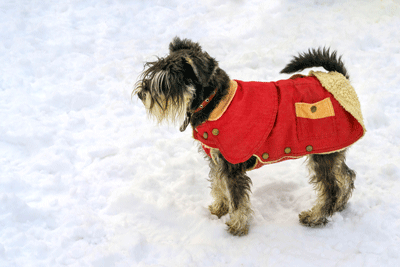BALTIMORE — Pets are in danger from being out in the cold just as much as humans are. Here are some tips from the Baltimore Humane Society for pet owners to keep their pets safe from the dangerous weather.
1. Bring your pets in! If it is too cold for you, it is too cold for your pet to stay outside for long periods of time. If you have outdoor cats or care for feral cats, check out this site on how to make a kitty enclosure: http://www.neighborhoodcats.org/How_To_Feral_Cat_Winter_Shelter
2. Coats! Yes, well fitting coats ARE helpful to many dog breeds. Short haired dogs, very small dogs (teacup breeds), older dogs, and breeds that have a naturally lean body (whippets, greyhounds…) can benefit from coats and should wear a jacket! They will keep dogs warm and dry just like they do for us. Breeds that do not have an undercoat (dogs with undercoats are breeds like shepherds, huskies, malamutes, retrievers) can get cold quickly.
3. Keep off of road salt. Not only is it toxic if your pet ingests it, it can be very irritating and even painful to their paw pads.
4. Wipe your pet’s paws off with a lukewarm washcloth to remove any melting salt so they do not ingest it when they groom themselves. Our pets’ paws are very sensitive to the salt that is typically put down when there is snow. The salt can also make them sick if accidentally ingested while they are grooming their paws. You can also try dog boots/booties to protect their paws when there is snow on the ground. Simpler, is to just wipe their paws off after each walk with a wash cloth. Instead of regular sidewalk salt for your home, use a product like “Safe Paws.” It works just as well and is safe if dogs step on it!
5. Consider applying a barrier to your pet’s paws like petroleum jelly to protect their paws while out on a walk.
It helps protect them from the salt as well as snow and ice build-up. Ice ball formed in the paw pads can often be prevented this way.
6. Keep your pet’s coat appropriately groomed. A healthy coat will work most efficiently in keeping warmth on the body and cold away.
7. Anti-freeze is extremely poisonous and also tempting to pets due to its sweet taste. Dogs and cats are actually attracted to it because it has a sweet taste. If you have it in your garage make sure it is kept up high in a leak proof container. Clean up any that might drip from equipment that uses it. If you believe your pet ingested anti-freeze, get them to a veterinarian immediately!
8. Pets exposed to cold temperatures for long periods of time can experience hypothermia. Signs of hypothermia include low body temperature, low heart rate, low respiration (breathing), violent shivering, and their gums may turn pale or blue. If you believe your pet is experiencing hypothermia, warm them slowly to avoid shock, and get them to a full service vet immediately.
9. Secure and brace outdoor gates and fences that could break from strong winds and snow.
10. Less time outside may mean a bored pet. Increase your animal’s indoor enrichment! Frozen kongs, food puzzles, and training games all provide mental exercise to tire out a pet who can’t get outdoors.
11. Cuddle up! Cold weather is the perfect time to spend snuggling and playing with your pet.
Here are two more tips for pets that are not your own:
1. When getting ready to start your car, tap on the hood first. Why? Outdoor cats and other wild animals like to hide under car hoods overnight because it is warm! Warm engines in parked cars attract cats and small wildlife who may crawl up under the hood. To avoid injuring any hidden animals, bang on your car’s hood to scare them away before starting your engine.
2. Speak out if you see a pet left in the cold. Here is advice from the Humane Society of the United States on how to handle the situation when you see a pet left in the cold. First politely let the owner know you’re concerned. If they don’t respond well, document what you see: the date, time, exact location and type of animal, plus as many details as possible. Video and photographic documentation will help bolster your case. Then contact your local animal control agency or county sheriff’s office and present your evidence. Take detailed notes regarding whom you speak with and when and respectfully follow up in a few days if the situation has not been remedied.
The Baltimore Humane Society (BHS), founded in 1927 by Mrs. Elsie Seeger Barton, is an independent, non-profit, no-kill animal shelter, which offers low-cost veterinary care to the public, and a pet cemetery with grief support services. The BHS receives no operational funding from the local or federal governments, or any national animal welfare organizations. For more information about BHS, and how you can contribute, volunteer, adopt or foster, visit: www.bmorehumane.org or call 410-833-8848.
